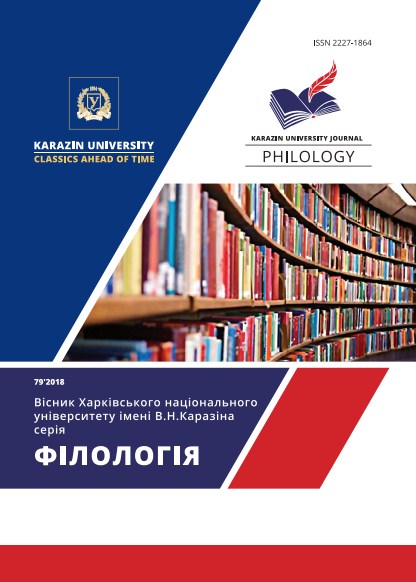Braun «Iphigenia in Freedom»: destroyed dialogue
Abstract
The article deals with the perception of Iphigenia’s myth by German playwright Volkner Braun. Solving the problem of freedom and the possibility of personality’s self-determination, outstanding writer in his dramatic fragment of verse «Iphigenia in Freedom» (1991) presented his interpretation of the classical plot, where bloody story of the Atrides is closely interwoven with historical events of German’s consolidation. Rejection of holistic plot in favor of fragmentariness of the narration allowed the author to represent his discrepant present-day reality.
The liberation of the heroine is happening as a result of the exchange without her participating in the process at all (even with her internal resistance), as she is considered to be dumb. The main part of the work is written in form of stream of consciousness, which is built on delusive inner associations, literary allusions (first of all to Goethe) and ironically reconsidered political slogans. The playwright represents Iphigenia’s liberty between the liberation and the sacrifice, whose destiny is closely connected with world’s history. Thanks to intertextual plays with prototexts, Braun keeps current the problem of legitimacy of compulsive actions in different historical contexts. The author tried to reproduce contemporary perception, his reaction to actual social changes and at the same time reflection on the historical process as a whole. If at the beginning of the work the writer combined the detailed myth's problems with the previous history, which was determined by fate, then further reflected the current development of history, which was close to the requirements of the myth.
Downloads
References
Кудрявцева Т. В., Шарыпина Т. А. Проблемно-тематический комплекс "ОСИ-ВЕСИ" в литературе воссоединенной Германии (на примере поэзии 1990-2000-х гг.) / Т. В. Кудрявцева, Т. А. Шарыпина // Известия высших учебных заведений. Поволжский регион. Гуманитарные науки. – 2016. – № 2 (38). – С. 105-118.
Шарыпина Т. А. Восприятие античности в литературном сознании Германии ХХ века ( Троянский цикл мифов): дис. … док. филол. наук: 10. 01. 05 / Т.А. Шарыпина. – Нижний Новгород: ННГУ, 1998. – 512 с.
Braun V. Iphigenie in Freiheit / V. Braun. – Frankfurt a. M. : Suhrkamp-Verlag, 1992. – 30 S.
Braun V. Leipziger Vorlesungen / V. Braun // Texte in zeitlicher Folge. 10 Bde. Halle 1990-1993. – S. 5-182.
Chiarloni A. Warum nimmt Thoas am S. Remo-Festival teil? Nachdenken über Iphigenie im zehnten Jahr der Wiedervereinigung / A. Chiarloni // Volker Braun. Arbeitsbuch. – Berlin : Hörnigk, Frank (Hg.), 1999. – S. 85-87.
Grauert W. Furor melancholicus auf wüstem Planum oder Abschied von der Präzeptorrole / W. Grauert // Ästhetische Modernisierung bei Volker Braun. Studien zu Texten aus den achtziger Jahren. – Würzburg : Epistemata, 1995. – S. 166-206.
Hermann C. Iphigenie Metamorphosen eines Mythos im 20. Jahrhundert / C. Hermann. – München: Martin Meidenbauer Verlagbuchhandlung, 2005. – 134 S.
Preußer H.P. Die Iphigenien. Zur Metamorphose der „unerhörten Tat“, Euripides – Goethe – Berg – Braun / H.P. Preußer // Mythen in nachmythischer Zeit. Die Antike in der deutschsprachigen Literatur der Gegenwart. – Berlin/New York : Walter de Gruyter Verlag, 2002. – S. 22-43.
Visser A. „Und so wie es bleibt ist es.« Volker Brauns Iphigenie in Freiheit: eine Dekonstruktion des deutschen Einigungsprozesses? / A. Visser // Literatur und Politische Aktualität. Amsterdamer Beiträge zur neueren Germanistik. –Amsterdam/Atlanta : Ibsch, Elrud/Van Ingen, Ferdinand (Hg.), 1993. – Bd. 36. – S.131-154.
Weder K. Geschichte als Mythos. Zu Volker Brauns „Iphigenie in Freiheit“/ K. Weder // Sprachkunst. Beiträge zur Literaturwissenschaft. – 2001. – Bd. 32. – S. 241-255.
References
Kudryavtseva, T. V., Sharyipina, T. A. (2016) Problemno-tematicheskiy kompleks «OSI-VESI» v literature vossoedinennoy Germanii (na primere poezii 1990–2000-h gg.) [The problem-thematic complex of the Axis in the literature of reunited Germany (on the example of poetry of the 1990-2000's]. Izvestiya vyisshih uchebnyih zavedeniy. Povolzhskiy region. Gumanitarnyie nauki [Educational Institutions in the Volga Region, Humanities]. no. 2 (38), pp. 105–118. [in Russian].
Sharyipina, T. A. (1998) Vospriyatie antichnosti v literaturnom soznanii Germanii XX veka (Troyanskiy tsikl mifov) [The perception of antiquity in the literary consciousness of Germany in the twentieth century (the Trojan cycle of myths)].(Ph Thesis), Nizhniy Novgorod: NNGU.
Braun, V. (1992) Iphigenie in Freiheit. Frankfurt : Suhrkamp-Verlag. [in German]
Braun, V. (1990-1993) Leipziger Vorlesungen. Texte in zeitlicher Folge. 10 Bde. Halle. [in German]
Chiarloni, A. (1999) Warum nimmt Thoas am S. Remo-Festival teil? Nachdenken über Iphigenie im zehnten Jahr der Wiedervereinigung. Arbeitsbuch. Berlin : Hörnigk, Frank (Hg.), pp. 85–87. [in German]
Grauert, W. (1995) Furor melancholicus auf wüstem Planum oder Abschied von der Präzeptorrole. Ästhetische Modernisierung bei Volker Braun. Studien zu Texten aus den achtziger Jahren. Würzburg : Epistemata, pp. 166–206. [in German]
Hermann, C. (2005) Iphigenie Metamorphosen eines Mythos im 20. Jahrhundert. München: Martin Meidenbauer Verlagbuchhandlung. [in German]
Preußer, H. P. (2002) Die Iphigenien. Zur Metamorphose der „unerhörten Tat“, Euripides – Goethe – Berg – Braun. Mythen in nachmythischer Zeit. Die Antike in der deutschsprachigen Literatur der Gegenwart. Berlin/New York : Walter de Gruyter Verlag,. pp. 22–43. [in German]
Visser, A. (1993) „Und so wie es bleibt ist es.« Volker Brauns Iphigenie in Freiheit: eine Dekonstruktion des deutschen Einigungsprozesses? Literatur und Politische Aktualität. Amsterdamer Beiträge zur neueren Germanistik. Amsterdam/Atlanta : Ibsch, Elrud/Van Ingen, Ferdinand (Hg.),. Bd. 36, pp.131–154. [in German]
Weder, K. (2001) Geschichte als Mythos. Zu Volker Brauns „Iphigenie in Freiheit“. Sprachkunst. Beiträge zur Literaturwissenschaft. Bd. 32, pp. 241– 255. [in German]




